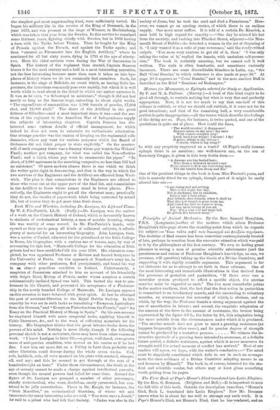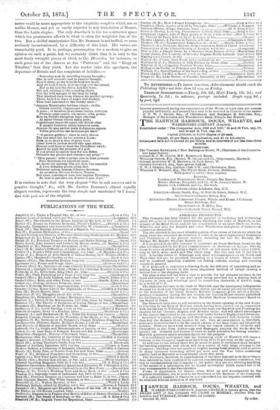The First Book of Pope's Homer's Iliad translated into Latin
Elegiacs. By the Hon. G. Denman. (Deighton and Bell.)—It is important to note the full title of this book. Outside the description runs thus, "Homer's Iliad, Book L, translated into Latin Elegiacs" Now Mr. Denman knows what be is about far too well to attempt any such work. It is Pope's Homer's Mad, not Homer's Iliad, that he has rendered, end no metre could be more appropriate to the exquisite couplets which are so unlike Homer, and yet so vastly superior to any translation of Homer, than the Latin elegiac. The only drawback is the too contracted space which the pentameter affords to what is often the weightier line of the two. But a skilful manipulator like Mr. Denman is not baffled, or even seriously inconvenienced, by a difficulty of this kind. His verses are remarkably good. It is, perhaps, presumption for a modern to give an opinion on such a point, but we certainly think that it is only to the most finely -wrought pieces of Ovid, to the Heroides, for instance, or such gems out of the Amores as the "Psittacus " and the "Elegy on Tibullus," that they yield. Let the reader take this specimen, the departure of Briseis and the complaint of Achilles :- "Patroclus now th' unwilling beauty brought ; She, in soft sorrows, and in pensive thought, Pass'd silent, as the heralds held her hand, And oft look'd back, slow-moving o'er the strand. Not so his loss the fierce Achilles bore ; But sad, retiring to the sounding shore, O'er the wild margin of the deep he hung, That kindred deep from whence his mother sprang ;
There, bath'd in tears of anger and disdain, Thus loud lamented to the stormy main :"
"Jamque Mentetiades invitam educit ; at lila, Obruta tristitid, virgineoque metu, It mute; et manibus prieconum inniza, retroque Flectens srepe oculos, viz movet, orbs, pedes. Non its Pelides abreptum laget amorem. At miser OCeinli MOM. Mies petit; Cognatisque impendit aquis, ubi dicitur olim E spumis Genetrix ortum habuisse suum. Jamque ibi quo patitur male dedignatus, enters Verbs, procelloso dat lacrymasque marl."
"' 0 parent goddess ! since in early bloom Thy son must fail, by too severe a doom; Sure, to so short a race of glory born, Great Jove in justice should this span adorn. Honour and fame at least the Tbuuderer owed; And ill he pays the promise of a god, If you proud monarch thus thy son defies, Obscures my glories and resumes my prime "
"'Diva patens! mihi si prime jam in Here juventas Fato decretum est asperiore mori ; At, breve cui spatium vine est, dum vita manebit A Jove debnerat gloria plena dart.
Debuerat saltem famam tribuisse decoram, As promissa Dei non violfisse, Tonans.
Sed nunc, contempsit mea jure impale Tyrannue, Et, taus si qua men eat, donave si qua, rapit.'"
It is curious to note that the very elegant "She in soft sorrows and in pensive thought," &c., with Mr. Justice Denman's almost equally elegant version, represents the very simple and unadorned 'H. r aszuuc afcz Tart yvvn zits of the original.







































 Previous page
Previous page